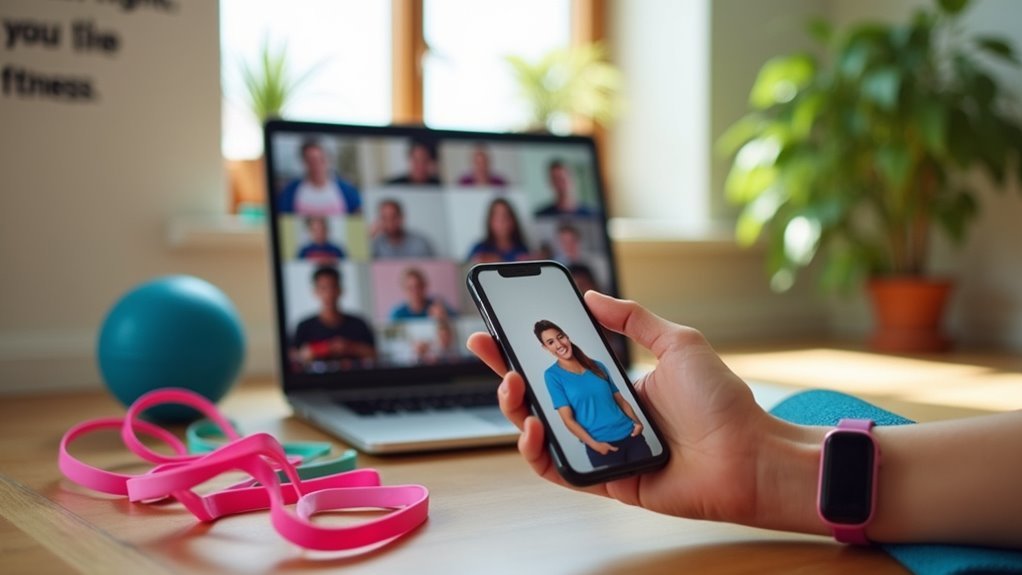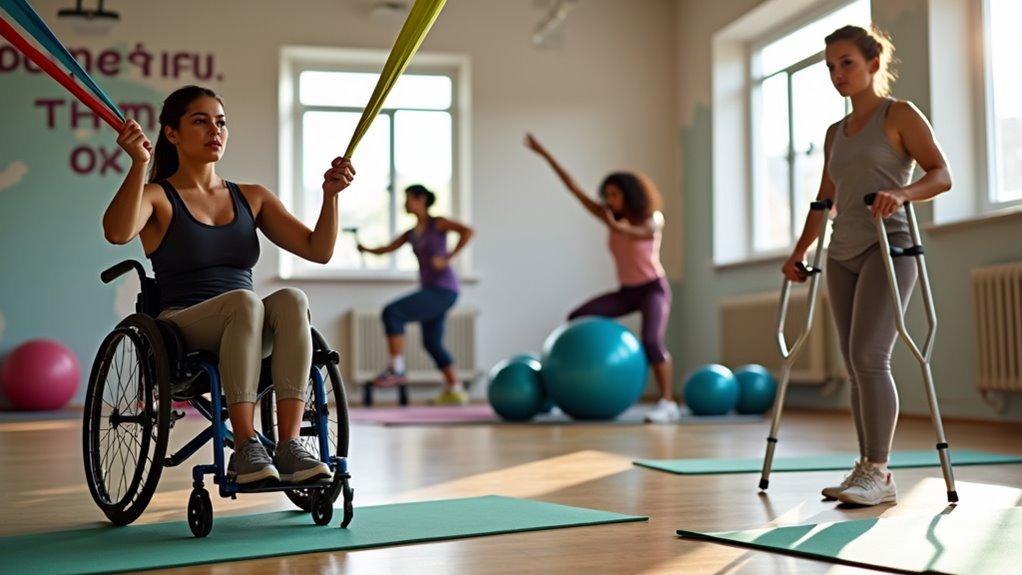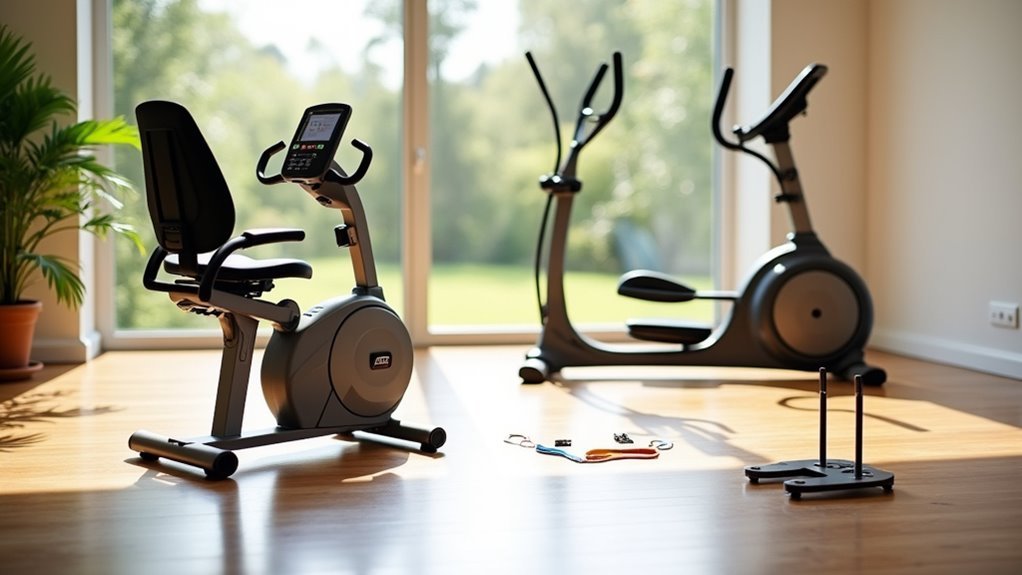You’ll boost your fitness accountability with three essential tech tools: extensive fitness apps like MyFitnessPal and Trainerize that track workouts and provide personalized analytics, wearable devices that monitor your activity levels and deliver real-time feedback on performance metrics, and digital community platforms like Strava that connect you with supportive peers through challenges and competitions. These technologies transform raw data into actionable insights while fostering motivation through gamification and social engagement that’ll keep you consistently committed to achieving your goals.
Fitness Apps That Drive Client Engagement and Progress Tracking
While traditional fitness tracking relied on pen and paper logs, today’s fitness apps transform how you monitor progress and stay engaged with your goals.
Apps like MyFitnessPal and Trainerize excel at progress tracking through extensive workout tracking and detailed analytics that show your performance trends over time. You’ll benefit from personalized feedback that analyzes your activity levels and suggests actionable improvements.
Modern fitness apps deliver comprehensive analytics and personalized insights that transform raw workout data into actionable performance improvements.
FitBudd delivers tailored workout plans customized to your specific needs while maintaining accountability through performance monitoring.
Strava’s community features boost client engagement by letting you share workouts, join challenges, and connect with friends for motivation.
This fitness technology provides real-time feedback that keeps you committed and accountable to achieving your objectives.
Wearable Devices for Real-Time Monitoring and Goal Achievement
Beyond smartphone apps, wearable devices take fitness accountability to the next level by delivering continuous, real-time monitoring directly from your wrist.
These fitness trackers and heart rate monitors provide instant feedback on your activity levels, calories burned, and workout intensity, keeping you engaged throughout your fitness journey.
You’ll benefit from GPS functionality that tracks outdoor activities like running and cycling, capturing detailed metrics including distance, speed, and route mapping.
When integrated with fitness apps, these devices help establish personalized goals while sending reminders to maintain accountability.
Advanced wearables also monitor sleep patterns and recovery metrics, optimizing your rest for better goal achievement.
With thorough progress tracking capabilities, you’re empowered to make data-driven decisions that accelerate your fitness success.
Digital Platforms for Community Support and Virtual Challenges

Although wearable devices provide excellent personal tracking, digital platforms amplify your fitness accountability by connecting you with supportive communities and engaging virtual challenges.
Fitness apps like Strava and MyFitnessPal incorporate social features that let you follow friends, share achievements, and participate in group competitions. These platforms foster community support through forums where you’ll find encouragement, advice, and shared experiences from fellow fitness enthusiasts.
Virtual challenges create competitive opportunities that boost your motivation and maintain consistent engagement with your fitness routines.
Gamification elements like badges and leaderboards make staying active enjoyable while strengthening accountability. When you’re part of these digital communities, you’re more likely to stick with your goals because others are cheering you on and tracking your progress alongside their own journeys.
Frequently Asked Questions
How Much Should I Budget for Comprehensive Fitness Accountability Technology?
You’ll want to budget $50-200 monthly for thorough accountability technology. This covers fitness apps, wearable devices, online coaching platforms, and smart equipment subscriptions. You’re investing in tools that’ll track progress and maintain motivation effectively.
What Happens to My Fitness Data if the Company Goes Out of Business?
You’ll likely lose access to your fitness data unless you’ve exported it beforehand. Most companies don’t guarantee data preservation after shutdown, so regularly backup your workout history, progress photos, and measurements to personal storage.
Can These Tech Tools Replace Having a Personal Trainer Completely?
You can’t completely replace a personal trainer with tech tools. While apps provide workouts and tracking, you’ll miss personalized form corrections, real-time motivation, injury prevention guidance, and customized programming that adapts to your specific needs.
How Do I Maintain Motivation When Technology Fails or Malfunctions?
When your devices break down, you’ll stay motivated by remembering your why, tracking progress manually with pen and paper, finding workout buddies for accountability, and celebrating small wins without relying on technology.
Are There Privacy Risks When Sharing Health Data With Fitness Platforms?
You’re exposing personal health information when you share data with fitness platforms. Companies can sell your information, experience data breaches, or use it for targeted advertising without your knowledge.
In Summary
You’ll achieve your fitness goals faster when you combine these three tech tools strategically. Start by choosing a fitness app that matches your tracking preferences, then pair it with a wearable device that monitors your daily activity. Don’t forget to join digital communities where you’ll find motivation and accountability partners. These technologies work best when they complement each other, creating an all-encompassing support system that’ll keep you consistent and motivated.





Leave a Reply